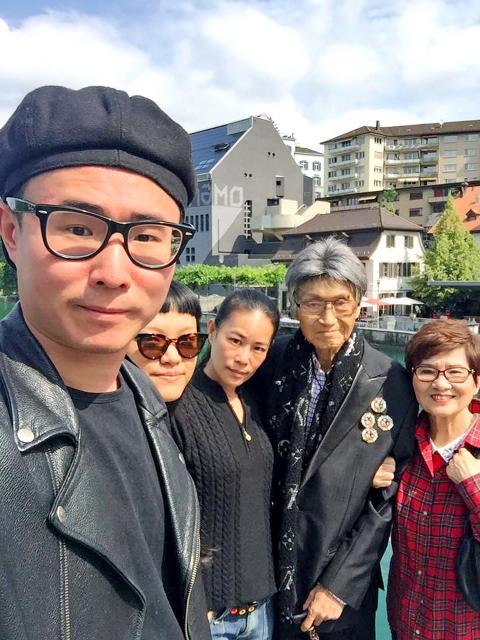Former sports commentator Fu Da-ren (傅達仁) yesterday underwent voluntary euthanasia at a Dignitas facility in Switzerland after deciding to end his life in a manner of his own choosing.
Fu, 85, had been diagnosed with terminal pancreatic cancer and had been pushing for Taiwan to allow euthanasia since 2016, but had turned to other organizations after making no headway in this nation.
Since his petition was approved by Dignitas last year, he had delayed the procedure eight times, but last month he traveled to Switzerland resolved to go through with the procedure.

Photo: screen grab from Facebook
Fu said he “was dying with dignity,” adding that his euthanasia would serve as a case study for the Taiwanese government and public so that they would treat the issue of euthanasia with the seriousness it deserves.
Just an hour before he entered the Dignitas facility, Fu updated his Facebook page, reminiscing about his life, as well as calling for the government to expedite the passage of a euthanasia act.
Fu was accompanied by his family members when the procedure was carried out.
Dignitas, which emphasizes the concept “to live with dignity, to die with dignity,” has helped more than 2,000 people end their life over the past two decades.
As Switzerland has not legalized euthanasia, the entire process is overseen by Swiss police and the body examined by coroners to ensure that there has been no criminal behavior, Dignitas said.
The Ministry of Health and Welfare yesterday said that the concept of euthanasia, or assisted suicide, is a contravention of the Criminal Code.
There is no domestic consensus on euthanasia, but the Patient Right to Autonomy Act (病人自主權利法), which is to promulgated on Jan. 6 next year, would serve to test the waters on the issue, the ministry said.
Under the act, which has been touted as the first of its kind in Asia, patients with five clinical conditions who have made an advance decision could have physicians partially or fully terminate, withdraw or withhold life-sustaining treatment, artificial nutrition and hydration in accordance with their advance decision.
The statutory conditions for such patients are that they are either terminally ill, in an irreversible coma, in a permanent vegetative state, suffering from severe dementia or another condition that is determined to be unbearable or incurable.
Additional reporting by Wu Liang-yi and CNA

NATIONAL SECURITY THREAT: An official said that Guan Guan’s comments had gone beyond the threshold of free speech, as she advocated for the destruction of the ROC China-born media influencer Guan Guan’s (關關) residency permit has been revoked for repeatedly posting pro-China content that threatens national security, the National Immigration Agency said yesterday. Guan Guan has said many controversial things in her videos posted to Douyin (抖音), including “the red flag will soon be painted all over Taiwan” and “Taiwan is an inseparable part of China,” while expressing hope for expedited “reunification.” The agency received multiple reports alleging that Guan Guan had advocated for armed reunification last year. After investigating, the agency last month issued a notice requiring her to appear and account for her actions. Guan Guan appeared as required,

A strong cold air mass is expected to arrive tonight, bringing a change in weather and a drop in temperature, the Central Weather Administration (CWA) said. The coldest time would be early on Thursday morning, with temperatures in some areas dipping as low as 8°C, it said. Daytime highs yesterday were 22°C to 24°C in northern and eastern Taiwan, and about 25°C to 28°C in the central and southern regions, it said. However, nighttime lows would dip to about 15°C to 16°C in central and northern Taiwan as well as the northeast, and 17°C to 19°C elsewhere, it said. Tropical Storm Nokaen, currently

‘NATO-PLUS’: ‘Our strategic partners in the Indo-Pacific are facing increasing aggression by the Chinese Communist Party,’ US Representative Rob Wittman said The US House of Representatives on Monday released its version of the Consolidated Appropriations Act, which includes US$1.15 billion to support security cooperation with Taiwan. The omnibus act, covering US$1.2 trillion of spending, allocates US$1 billion for the Taiwan Security Cooperation Initiative, as well as US$150 million for the replacement of defense articles and reimbursement of defense services provided to Taiwan. The fund allocations were based on the US National Defense Authorization Act for fiscal 2026 that was passed by the US Congress last month and authorized up to US$1 billion to the US Defense Security Cooperation Agency in support of the

PAPERS, PLEASE: The gang exploited the high value of the passports, selling them at inflated prices to Chinese buyers, who would treat them as ‘invisibility cloaks’ The Yilan District Court has handed four members of a syndicate prison terms ranging from one year and two months to two years and two months for their involvement in a scheme to purchase Taiwanese passports and resell them abroad at a massive markup. A Chinese human smuggling syndicate purchased Taiwanese passports through local criminal networks, exploiting the passports’ visa-free travel privileges to turn a profit of more than 20 times the original price, the court said. Such criminal organizations enable people to impersonate Taiwanese when entering and exiting Taiwan and other countries, undermining social order and the credibility of the nation’s